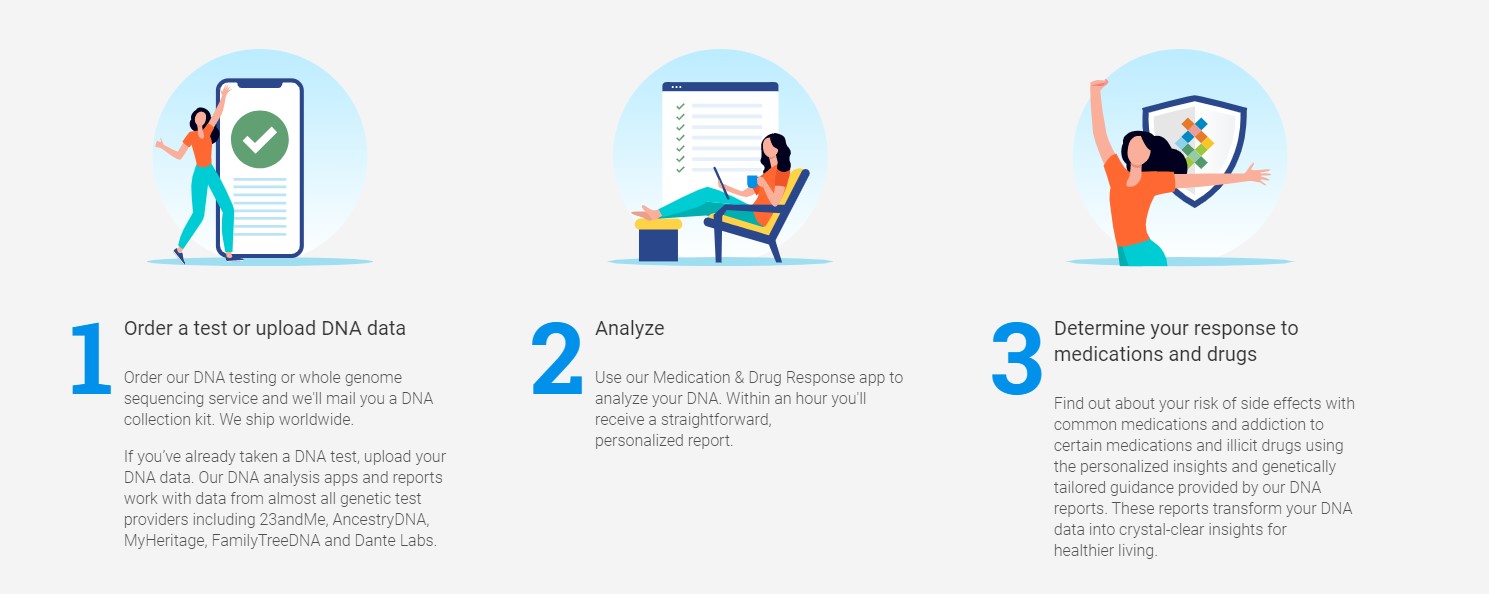
By Dr. Brandon Colby MD, a medical expert specializing in preventive medicine and clinical genomics.
Side effects are uncomfortable reactions to medications or drugs. These side effects can range from being mild to severe.
Potential side effects that are usually mild may include, but are not limited to:
- Headache
- Nausea
- Dry Mouth
- Stomachache
- Dizziness
- Diarrhea
- Constipation
These side effects may not impact life too much and may only be temporary. Severe side effects may end up causing a lot of disruption in a person's life. Examples of this include:
- Severe side effects can lead to injury or death - drowsiness can cause a car accident or injury when operating heavy machinery.
- Many people believe they are suffering from side effects and may actually be suffering from another medical condition, such as having difficulty breathing or shortness of breath, which could be a heart attack.
- Erectile dysfunction, another common side effect, can affect life significantly leading to depression and failed relationships.
- Undergoing cancer treatment with radiation therapy or chemotherapy drugs may result in hair loss, which can be devastating to some people.
- Mental health disorders like depression may require antidepressants to treat. Possible side effects are weight gain and suicidal thoughts. Both of these side effects could worsen depression and lead to life-threatening consequences.
- Even birth control can lead to severe side effects like blood clots.
- Cholesterol medication may reduce the risk of a stroke but it can decrease the quality of life for some people but causing weight gain, dizziness, nausea, and muscle pain.
Not all side effects last forever. Some side effects are temporary or last as long as the person continues taking prescription medicine. Others last much longer (even a lifetime), which can be quite traumatizing to people. For instance, there are some experts who believe there are long-lasting side effects from COVID that we're not aware of just yet. Understanding what those side effects are can lead to a strategy to prevent them. Knowing how long side effects last can help with the decision on whether to use a particular drug.
How Long Side Effects Last
If you're wondering how long side effects last, you'll be happy to know they can last just a few hours. However, some people can experience side effects for much longer - days, months, or indefinitely. Why is the range so wide? It's because everyone's body is different. The way that prescription drugs and even over-the-counter medications interact with a body is influenced by many factors.
Health care providers can provide information on how long side effects last by checking a medication guide. The next time the doctor prescribes prescription medication, ask about common side effects and if they are known to last a short or long time.
Factors Affecting How Long Side Effects Last
Most people do not know how long their side effects will last until they go through them. Constipation, dry mouth, headaches, upset stomach, and many other common side effects can greatly affect people's quality of life, though. These effects of medicine on the body can also lead to medication non-compliance and worsening of the medical condition they are meant to treat. Fortunately, knowing how long side effects last can help those suffering know what to do next.
Dosage
Taking a higher dose than needed can often lead to adverse effects. The body cannot metabolize such a high dose fast enough, so it ends up affecting a part of the body it wasn't intended to, such as the stomach. Speak to your health care professional for medical advice on if the dosage should be reduced.
Allergic Reaction
Some people are simply allergic to an active ingredient in the medication, so the body responds undesirably. Since some allergic reactions can be life-threatening, it's essential to discuss any adverse events previously experienced with the prescribing physician.
Medical Conditions
Suffering from some medical conditions put people at risk for drug side effects of medications for other health concerns. For instance, someone with low blood pressure may receive a medication to prevent migraines that lowers blood pressure, this may cause serious side effects. Always review your medical history with the treating physician.
People who are ongoing cancer treatment with radiation therapy or taking chemotherapy drugs may be more susceptible to side effects. These side effects may last as long as they are under cancer treatment. Those going through this medical condition should speak to their care team for support and guidance.
Drug Interactions
Side effects will last a very long time if the cause of them is not resolved. For instance, those who are taking other medications or supplements as part of home remedies may continue to suffer from the ill effects of their new medication because they don't interact.
An example of a drug interaction that many people are not aware of is grapefruit juice and statins. Grapefruit juice may be healthy for people to drink, but it can cause some serious side effects.
The Metabolization of the Drugs
How long it takes for the body to break down the meds matters and some people's bodies simply take longer than others. Most people will metabolize medication by half every time it circulates the body. For example, if someone takes 100 mg of a drug, only half of it will be in the bloodstream in a couple of hours.
While this may seem like it would be out of a person's body quickly, the rate of it being broken down is much slower afterward. Only 10 mg may be excreted by the body the next time it goes through the liver, and possibly only 5 mg the next pass.
Weight
Weight influences how fast medication breaks down in the body, so it also affects how long side effects will last. Usually, but not always, the bigger a person is the slower it takes for drugs to break down and leave the body. This may lead to the person needing a higher dose compared to someone who is much smaller.
Ethnicity
People from different ethnic backgrounds process medications differently. This is why family members often have the same issues with drugs as others in their family.
The factors influencing how long side effects last may not provide the answer most are looking for, but it does explain why some people can't take certain medications because the side effects are unbearable.
Serious side effects should be reported to a physician and/or PharmD for medical advice. The National Institute of Health (NIH) and the U.S. Food and Drug Administration (FDA) monitor the side effects of new and approved medications to ensure safety. However, since people's bodies react so differently to drugs, they often have to change their stance on certain drugs.
This is why the FDA has a program called MedWatch that encourages Americans to report adverse reactions.
| Serious side effects should be reported to a physician and/or PharmD for medical advice. The National Institute of Health (NIH) and the U.S. Food and Drug Administration (FDA) monitor the side effects of new and approved medications to ensure safety. However, since people's bodies react so differently to drugs, they often have to change their stance on certain drugs. This is why they have a program called MedWatch that encourages Americans to report adverse reactions. |
How to Get Rid of the Side Effects of Medicine
It's possible to get rid of or reduce the severity of side effects. Click below for effective ways to alleviate the discomfort felt from side effects and learn how to get a free Medication and Drug Reaction DNA Report.
About The Author
Dr. Brandon Colby MD is a US physician specializing in the personalized prevention of disease through the use of genomic technologies. He's an expert in genetic testing, genetic analysis, and precision medicine. Dr. Colby is also the Founder of Sequencing.com and the author of Outsmart Your Genes.
Dr. Colby holds an MD from the Mount Sinai School of Medicine, an MBA from Stanford University's Graduate School of Business, and a degree in Genetics with Honors from the University of Michigan. He is an Affiliate Specialist of the American College of Medical Genetics and Genomics (ACMG), an Associate of the American College of Preventive Medicine (ACPM), and a member of the National Society of Genetic Counselors (NSGC).
